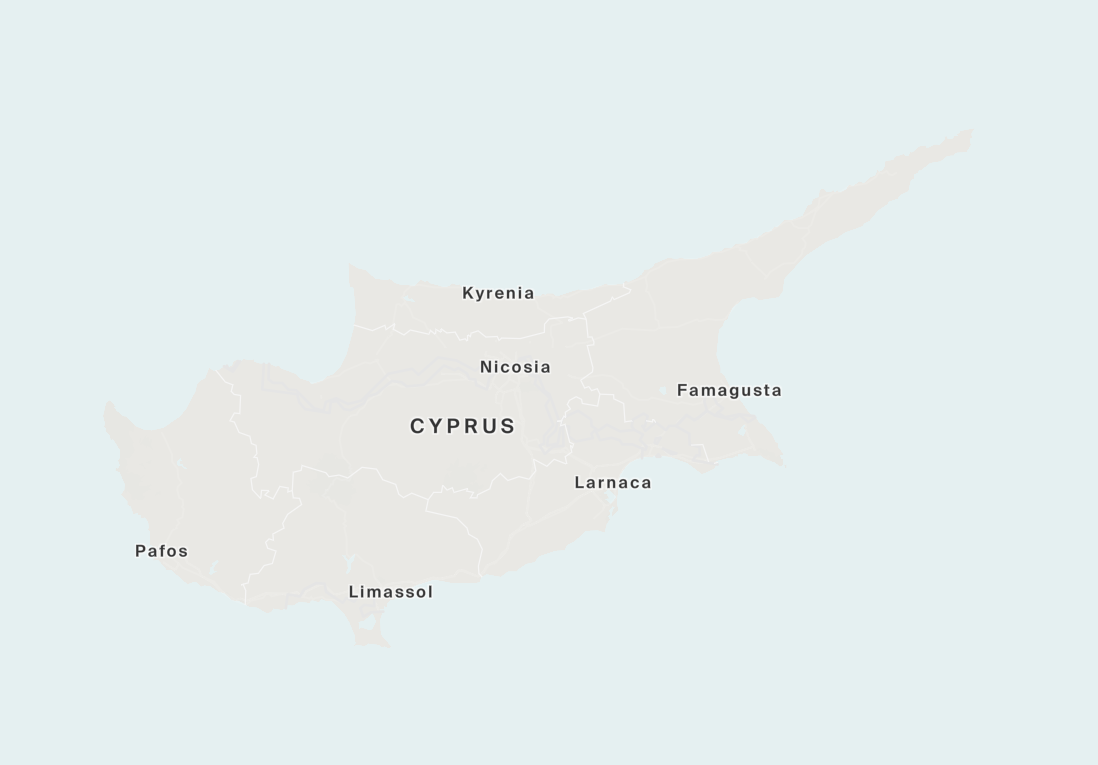What is Cyprus DNA Ethnicity on Ancestry?
The results of our AncestryDNA tests may sometimes be what we expect or on occasion may be a big surprise. Either way, often we need a little more information regarding some of the regions that arise in our ethnicity estimates.

One region that is not at all uncommon is the Cyprus DNA region. Those who still live in this region already understand all about its history and culture. There are others, however, who may never have even visited or in fact been aware that they have ancestors from that area.
In this post we will go into more detail with regards to the history, geography and culture of the Cyprus region. We will also discuss what it means to be from this region and how easy or difficult it might be to trace our roots in the Cyprus Region.
What Is the Cyprus DNA Region?
The Cyprus DNA region is located in the eastern Mediterranean Sea and focuses on the island of Cyprus. It shares no land borders but has neighbors which include Turkey to the north, Syria to the east. Greek islands to the west and Egypt to the south.

Cyprus Region History
Prehistory
The earliest confirmed site of human activity on the island of Cyprus is Aetokremnos, a rock shelter that is situated on the south coast. This indicates that hunter-gatherers were active on the island from at least 10,000 BC. Indications of settled village communities on the island dating from 8,200 BC.
Fossil records seem to indicate that soon after humans arrived on Cyprus the Cyprus dwarf hippopotamus and the Cyprus dwarf elephant both became extinct, likely as a result of the hunters. These were the only large land mammals endemic to the island.

Greek settlers began to arrive on Cyprus in two waves of Bronze age migration, the first of which was in the form of Mycenaean traders around 1,400 BC. The second wave came after the collapse of the Mycenaeans between 1,100 – 1050 BC. During this period the island became predominantly Greek in terms of culture.
Phoenicians
The Phoenicians were a seafaring peoples from Lebanon on the west coast of the Arabian Peninsula. They were frequent visitors to the island of Cyprus and would extend their political influence in the Mediterranean to the Cypriot city of Kition on the south coast.
It was Phoenician merchants that helped establish the presence of these eastern Mediterranean peoples in Cyprus around the 10th century BC.
Middle Eastern Influences
Based on its location in the eastern Mediterranean, Cyprus is a strategic location within the Middle East. This is why it saw occupation by various groups including the Neo-Assyrian Empire for a century starting in 708 BC. It was later ruled for a brief period by the Egyptians and then eventually fell under Achaemenid rule in 545 BC.
Maintaining Greek Culture
Despite many Middle Eastern influences the native peoples of Cyprus would maintain their own version of Greek culture and practices. The Persians and even Alexander the Great himself may have taken control of the island but its peoples kept to their traditions.
Romans
When the Roman Empire was divided into Eastern and Western parts around 286 Cyprus would become part of the East Roman Empire, more commonly referred to as the Byzantine Empire. Cyrus would remain part of the Byzantine empire for around 900 years and finally its ancient Greek influences started to fade.

Cyprus started to develop a strong Hellenistic-Christian character during the Byzantine centuries which remains strongly rooted in the culture of the modern-day peoples of the island.
During the 900 years of Byzantine influence raiders from the Levant region to the east were a constant concern. Some assaults were so severe that whole cities were destroyed and never rebuilt. These raiders from the Arabian Peninsula destroyed all of the Byzantine churches and saw brief periods of control over the island. The Byzantines did however establish complete control again in 965.
In 1156 Raynald of Châtillon and Thoros II of Armenia so brutally sacked Cyprus that it would take generations to recover. These Armenian raiders took so much plunder and captured so many of the leading citizens as well as their families to hold for ransom that the island was hugely impacted financially and politically.
Decades later in 1185 Isaac Komnenos, a member of the Byzantine imperial family, took control of Cyprus and declared it independent of the Empire. Just 6 years later, during the Third Crusade, Richard I of England took control of the island from Isaac.
It became a major supply base for English crusaders which was relatively safe from Saracen attacks. Richard would eventually sell the island to the Knights Templar. Following a bloody revolt on the island the Knights in turn sold it to Guy of Lusignan who was a French Poitevin knight. Guy's brother and successor Aimery would be crowned King of Cyprus, a move acknowledged by the Holy Roman Emperor Henry VI.
In 1473 the last Lusignan king of Cyprus James II died with no heir leaving his Venetian born widow Queen Catherine Cornaro as figurehead monarch. Through Catherine the Republic of Venice would take control of the island and officially annex Cyprus in 1489.
Ottomans
In 1570, a full-scale Ottoman assault using 60,000 troops would bring the island under Ottoman control. The Ottoman forces who captured Cyprus massacred many Greek and Armenian Christian inhabitants quickly putting a stop to local resistance. The Latin influences in Cyprus were destroyed with this brutality creating a significant demographic shift. Cyprus became more of a Muslim community under Ottoman rule.
The Soldiers who had fought in the conquest would settle on the island while Turkish peasants and craftsmen migrated from Anatolia. This new Muslim community would also include banished Anatolian tribes, members of various "troublesome" Muslim sects, and new converts to the faith
How Did You Get Cyprus Region DNA?
If you already know that you had family who came from Cyprus or any of the bordering states then you know why you have Cyprus region DNA. If this result came as a surprise you may not know how exactly you came by DNA from this region.
If you have a sizable percentage of DNA from this region then it is likely you have an ancestor who was born in or close to the country of Cyprus.
Is the Result Accurate?
When it comes to ethnicity estimates the higher the percentage you have from a certain region the more likely it is to be accurate. If your percentage is low, however, then it is harder to pinpoint exactly where your most recent ancestors came from.

A low result could mean a distant ancestor from that region. It is best to focus on your highest rated region's matches to determine where your ancestors came from more recently. A low percentage can often be hard to locate because the ancestor in question could be many generations back in your tree.
How to Research my Ancestry from These Regions
The results of a DNA ethnicity test are of course a great place to start especially if there is an unexpected result found in the report. As always of course the DNA cannot tell the whole story and we need to actually do the research work.
A percentage on an ethnicity estimate means very little unless you follow through and start building up your family tree. The relevant ancestors may be several generations back and it may take a lot of research to discover who they were.
If you have specific regions mentioned in your report then you have a good idea of where your ancestor may have originated from. Ancestry DNA even has migratory information from some of these regions through to the final settlement places in the United States or elsewhere in the world.
Using Ancestry you may be able to determine not only who your ancestors were but where they are from in the region and perhaps the reason they decided to move.
Cypriot Migration
The island of Cyprus did not supply many immigrants to the early days of European migration to the United States but some level of immigration did start in the 1930s. The few Cypriots who came before this time may have done so to escape religious persecution and may have assimilated with Greek settlers.
The periods of greatest emigration were between 1955 and 1959, the 1960s and between 1974 and 1979. Political instability and socio-economic insecurity were the driving factors for example a period of anti-colonial struggles. Some 29,000 Cypriots amounting to around 5 percent of the population left the island during the mid to late 20th century for the United States alone.
Final Thoughts
Cyprus is a medium sized Mediterranean island who thanks to its strategic location has played host to numerous major European and Middle Eastern empires. Heavily Greek for much of its history it has also seen a strong Muslim presence which has left a clear mark on the population as it stands today.
Link To or Reference This Page
We spent a lot of time downloading, cleaning, merging, and formatting the data that is shown on the site.
If you found the data or information on this page useful in your research, please use the tool below to properly cite or reference Name Census as the source. We appreciate your support!
-
<a href="https://namecensus.com/blog/what-is-cyprus-dna-ethnicity-on-ancestry/">What is Cyprus DNA Ethnicity on Ancestry?</a>
-
"What is Cyprus DNA Ethnicity on Ancestry?". NameCensus.com. Accessed on May 7, 2024. https://namecensus.com/blog/what-is-cyprus-dna-ethnicity-on-ancestry/.
-
"What is Cyprus DNA Ethnicity on Ancestry?". NameCensus.com, https://namecensus.com/blog/what-is-cyprus-dna-ethnicity-on-ancestry/. Accessed 7 May, 2024
-
What is Cyprus DNA Ethnicity on Ancestry?. NameCensus.com. Retrieved from https://namecensus.com/blog/what-is-cyprus-dna-ethnicity-on-ancestry/.
